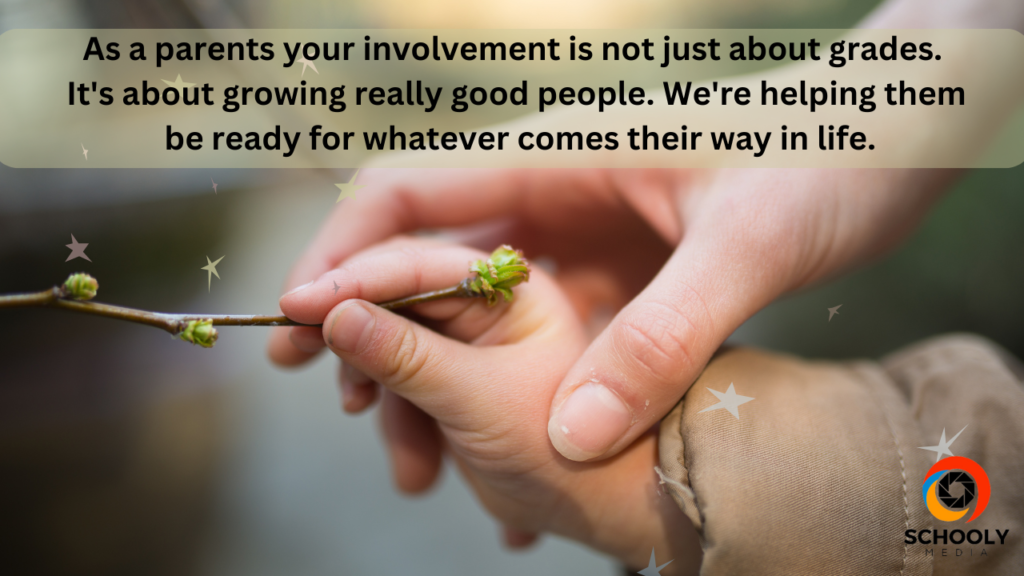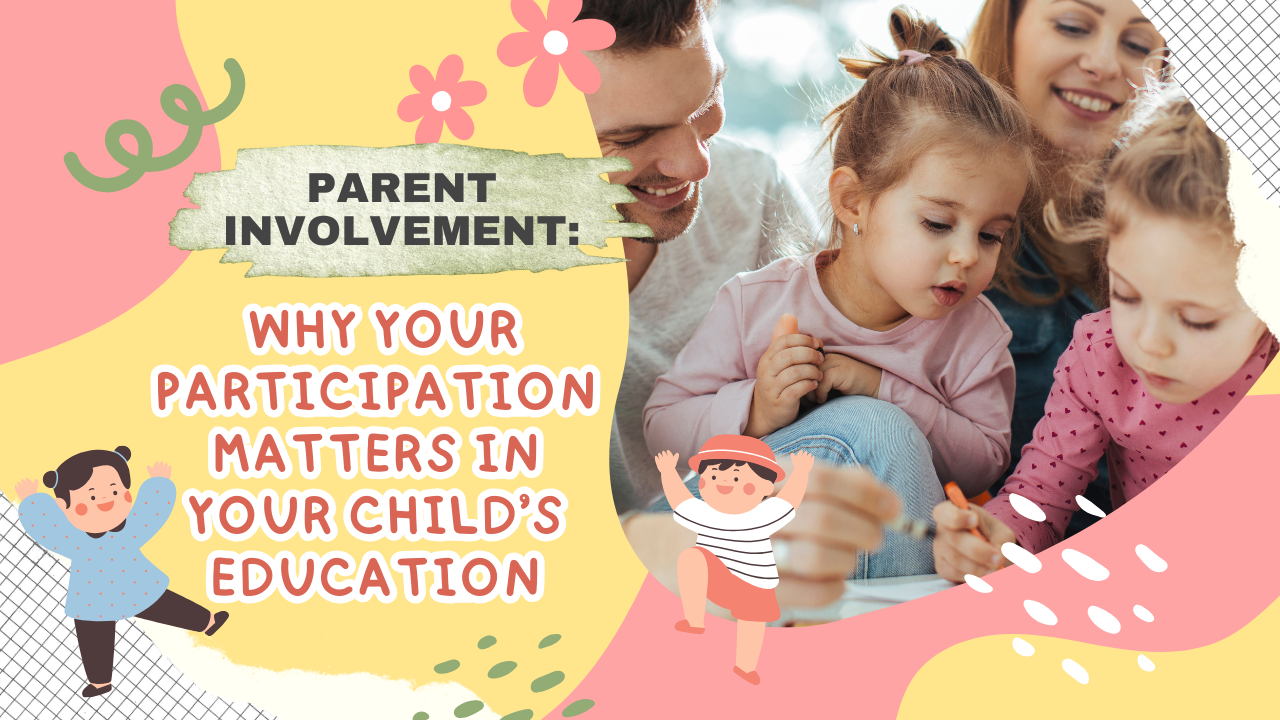We, as parents, are key in our kids’ school life. How we are involved affects their grades, growth, and how they enjoy learning. This article looks into why parent involvement matters, offering tips to be better partners in our kids’ schooling.
Key Takeaways
- Parental involvement is essential for a child’s academic and personal development.
- Participating in our child’s education helps build a strong foundation for their success.
- Fostering a positive attitude towards learning can significantly impact a child’s academic performance.
- Effective communication with teachers and school staff is crucial for supporting our child’s educational needs.
- Creating a supportive learning environment at home can encourage academic growth and a love for learning.
The Importance of Parental Engagement
Being involved in our kids’ education is crucial. It helps them do well in school and grow as individuals. Engaging with their learning process early on sets the stage for future success. Parental involvement isn’t just about checking homework or going to school meetings. It’s also about making learning a positive experience. This way, children see education as something exciting and important for their futures.
Building a Strong Foundation for Success
Research proves that kids with involved parents do better in school. They attend more often and have a positive view of learning. When parents help at school, join events, or talk with teachers, it shows children education matters. This motivates them to work hard, leading to better grades.
Fostering a Positive Attitude Toward Learning
How we show interest in our children’s school life matters a lot. If we celebrate their wins and create a supportive home for learning, they view school positively. A good mindset helps them tackle tough topics and stay motivated. These are key for their success later in life.
Being actively engaged as parents benefits our children in many ways. Yes, it boosts school success. But it also shapes their whole outlook on learning and life. This support and interest in their education last a lifetime.
“The most accurate predictor of a student’s achievement in school is not income or social status, but the extent to which that student’s family is able to:
1) Create a home environment that encourages learning;
2) Express high (but not unrealistic) expectations for their children’s achievement and future careers; and
3) Become involved in their children’s education at school and in the community.”
Strategies for Effective Parent Involvement

Being involved in your child’s education is key to their success and growth. Through strategic involvement, we create a positive learning space and assist in our child’s schooling. Let’s check out some ways to become an active part of our child’s educational journey.
Establish Open Communication with Teachers
Getting along with your child’s teachers is important. Try to attend meetings where teachers talk to parents. Stay updated on your child’s progress and discuss any issues or hurdles. This teamwork helps in meeting your child’s needs and boosts their learning.
Volunteer in the Classroom or School
Spending time and using your talents to help at school can be very meaningful. You might help with class work, go on trips, or join events. Doing so shows your dedication to your child’s education. It bonds you more with your child while benefiting the school community.
Encourage Active Learning at Home
Making your home a place that promotes learning is vital. Set up a study area, choose times for homework and reading, and talk to your child about what they’re learning. Being involved this way shows your child how important learning is. It helps create a love for learning that lasts a lifetime.
Attend School Events and Extracurricular Activities
Being present at your child’s school activities like shows, games, or events is very supportive. It shows you’re interested in what they do. Also, it helps you learn more about their hobbies and talents. This makes it easier for you to support them in ways that really matter to them.
Collaborate with the School Community
Getting involved with the wider school community, like by joining parent groups or attending meetings, gives you a role in your child’s school life. It lets you work with teachers, leaders, and other parents. Together, you can help make choices that positively affect your child and all students.
By following these parent involvement strategies, we can build a strong bridge between home and school. This leads to better parenting and supports our children’s success both academically and personally.
| Parent Involvement Strategies | Benefits |
|---|---|
| Establish Open Communication with Teachers | Fosters a collaborative approach to address the child’s needs and support their learning. |
| Volunteer in the Classroom or School | It demonstrates commitment to the child’s education and strengthens the parent-child bond. |
| Encourage Active Learning at Home | It reinforces the importance of education and inspires a lifelong love of learning. |
| Attend School Events and Extracurricular Activities | Shows support for the child’s achievements and helps parents understand their interests and talents. |
| Collaborate with the School Community | Allows parents to contribute to the decision-making process and advocate for the needs of their child and the student body. |
Communicating with Teachers and School Staff
Supporting our kids in school needs good communication with teachers and school staff. This teamwork can really help our children succeed in their studies and feel good about themselves.
Talking often with our child’s teachers keeps us updated on their learning, behavior, and needs. It helps us support them better at home. It also lets us know how to deal with any school problems they might have.
The Benefits of Parent-Teacher Collaboration
When we work together, parents and teachers can make a big difference for our kids. This teamwork:
- It shows us what our children are good at, where they struggle, and how they learn best
- Warns us about any problems early so we can fix them together
- Shares smart ideas and plans to help our kids learn and grow
- It makes us both care about our child’s education
Establishing Positive Relationships with Educators
Strong relationships with teachers and staff help us help our kids. Here are some ways to build and keep good relationships:
- Introduce ourselves and say we want to help with our child’s education
- Go to meetings and school events whenever we can
- Answer emails or calls from the school right away
- Help out or volunteer at school when it’s possible
- Work together and respect each other

Putting parent-teacher communication and school staff collaboration first lays a strong foundation for our kids’ triumph. Together, we guarantee our children get the help and attention they deserve, making their school and life both better.
| Benefits of Parent-Teacher Collaboration | Strategies for Positive Relationships |
|---|---|
| Understanding our kids’ learning needs better Fixing problems early and smoothly Getting great advice and support Caring about our kids’ school together | Start by saying hello and showing we care Be there for meetings Stay in touch and be quick to respond Help at school when we can Work and talk together with respect |
“Talking between parents and teachers is key for kids to do well. It helps us understand and work together to make our child’s school and feelings better.”
Encouraging Academic Growth at Home
Parents play a crucial role in helping children grow academically. We can create a learning space that supports their school work. This helps them enjoy learning and do better in school. Let’s take a look at how we can promote learning at home.
Creating a Supportive Learning Environment
Having a place for studying at home can really help our kids. It should be quiet, bright, and without distractions. This lets them concentrate on their work. It’s also good to set a specific time for homework and other learning activities.
Mixing educational activities into our daily schedules works wonders. We can suggest books, podcasts, or fun learning apps to our kids. This makes learning blend naturally into their day. They start to see learning as something enjoyable.
If we talk and work with our kids on their school goals, they do better. Regular talks about what they’ve achieved, where they’re finding it tough, and what they need to improve on are very helpful. This keeps them interested in learning.

Creating a supportive and warm home atmosphere is key for kids’ school success. A good, yet cozy, learning space at home helps kids do their best and grow.
| Strategies for Encouraging Academic Growth at Home | Benefits |
|---|---|
| Establish a dedicated study space | Improves focus and concentration |
| Integrate educational resources into daily routines | Promotes a love of learning |
| Collaborate with children on academic goals | Enhances motivation and engagement |
| Foster a nurturing and supportive home environment | Empowers children to reach their full potential |
By using these methods, we create a home learning environment that motivates our kids to excel in school. It also helps them love learning throughout their lives.
Overcoming Barriers to Parental Involvement
Parental involvement is essential for a child’s school success. Yet, many face obstacles that stop them from getting involved. It’s crucial to tackle these barriers to parent involvement. Doing so helps in overcoming challenges. It also helps build a strong bond between families and schools.
Many parents find it hard to make time for their kids’ schools. They have jobs, families, and other duties. To help, schools can be more flexible. They can schedule parent-teacher meetings or events at different times.
- Providing online tools helps parents stay involved, even from afar.
- They can also find ways to help that match their busy schedules, like joining the PTA or doing fundraising work at home.
For parents with language or cultural differences, things might be harder. Schools can help by offering translation support, having multilingual events, and making sure everyone can understand the information they share.
“When parents feel welcomed and valued, they are more likely to become active partners in their child’s education.”
Some parents might feel unsure about being part of school life. This is common if they had bad experiences with school before. To help, schools should be welcoming and provide places for parents to learn and connect. They also need to listen to and address parents’ worries.
Dealing with these barriers to parent involvement is essential. It helps all families get more involved in their kids’ educations. By working together, families and schools can face the challenges and create a caring community for learning and success.
The Long-Term Benefits of Parent Participation
Being involved in our kids’ education is crucial. It makes a big difference in their lives. We help them learn now and set the stage for their future success.
Strengthening the Parent-Child Relationship
Getting involved boosts our bond with our kids. It shows them we’re there for them. Trust and open communication are key in a strong relationship.
It helps our kids feel safe as they grow up. They know they can talk to us about anything. We’re building a bond that’ll last a lifetime.
By joining in on their school life, we tell our kids something important. We care about what they learn and we’re ready to help. This makes them feel more sure of themselves and respect learning more.
In the end, it’s not just about grades. It’s about growing really good people. We’re helping them be ready for whatever comes their way in life.
Conclusion
Looking back on what we’ve learned, it’s clear that parents play a key role in their child’s success at school. When we get involved in our child’s learning, they have a better chance of doing well. We help set the stage for their growth and learning.
The important things we’ve talked about include having a positive outlook on learning and talking with teachers. Also, it’s vital to make our home a place that supports learning. When we focus on these, we help our kids become their best and enjoy learning for life.
We urge parents to step up and stay active in their child’s school life. Working with teachers, using the tips we’ve shared, and always standing up for your child are crucial. Together, we make sure our kids have what they need to do great in school and in life.

FAQ
How can we, as parents, get more involved in our child’s education?
One of the best ways to help our children is by being part of their education. We can help by showing up at school events and talking with teachers often. This lets us lay the groundwork for our child’s success.
What are the benefits of being an involved parent?
Being involved helps in many ways. It boosts our child’s love for learning, makes them do better in school, and strengthens our bond with them. Studies show it also leads to better attendance, higher graduation rates, and more motivation in kids.
How can we create a supportive learning environment at home?
We can make a good studying place at home, keep a regular homework schedule, and promote reading and learning new things. This shows our kids how important learning is and gives them the tools to succeed in their studies.
What are some effective strategies for communicating with teachers and school staff?
Good, open talks with our children’s teachers are key to their success. We should set up regular meetings, be active in parent-teacher talks, and help in creating learning plans. A positive and problem-solving attitude helps us build a team with teachers. This supports our kid’s specific needs.
How can we overcome common barriers to parental involvement?
We all face challenges, like being too busy with work or family obligations. But we can beat these hurdles by talking to the school, using all the help they offer, and finding new ways to join in. This way, we can be more involved in our child’s learning.






